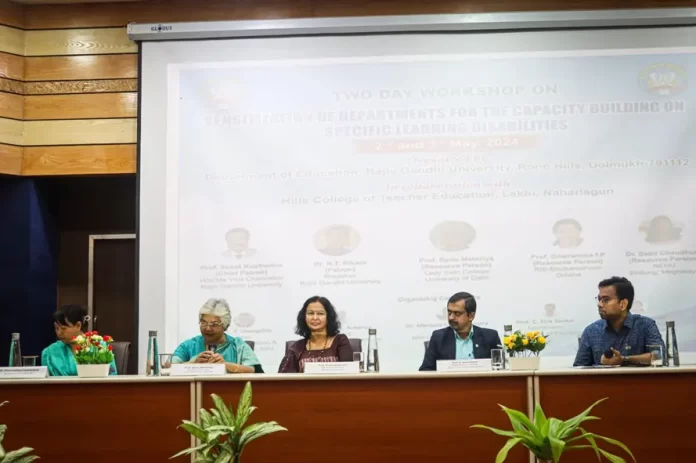RONO HILLS, 4 Apr: A panel discussion on mental health and wellbeing, as part of a two-day workshop on ‘Sensitisation of departments for capacity building on specific learning disabilities’ was held at Rajiv Gandhi University (RGU) here on Saturday.
It was focused on promoting students’ wellness in terms of “good physical and mental health, psychosocial wellbeing, and sound ethical grounding for high-quality learning,” the university informed in a release.
RGU Education Department Prof C Siva Sankar, Prof Renu Malaviya from Lady Irwin College, University of Delhi, Prof Gowramma IP from NCERT, RIE, Bhubaneshwar (Odisha), and RGU Psychology HoD (i/c) Assistant Professor Dr Dharmeshwari Lourembam were the panelists of the discussion, which was moderated by RGU Social Work HoD Dr Ravi Ranjan.
Dr Ravi Ranjan Kumar explained that “the programme was conceptualised the day before, when secretary, department of higher education, ministry of education, K Sanjay Murthy, virtually chaired the orientation session on ‘Integrated approach to promoting positive mental health, resilience, and wellbeing in centrally-funded HEIs’.”
He emphasised the need for “designing programmes to foster sustained capacity building among faculty in HEIs and facilitate the exchange of best practices,” and suggested “prioritising collaboration with a panel of experts to address the psychological and emotional wellbeing of students.”
During the discussion, Prof Renu Malaviya emphasised that both mental health and physical health are essential in human life and they both cannot be compromised. She highlighted “the significance of face-to-face interaction for better social life” and addressed the challenges posed by “the increasing reliance on technology transforming human beings into digital entities, which affects mental health.”
She also emphasised “the importance of empathy in a society that increasingly talks about tolerance.”
Prof Gowramma IP said, “Mental health is needed for developing psycho-social competencies, and it should be part of every system of education.”
Prof C Siva Sankar highlighted how thinking process, brain structure, problem-solving abilities, self-awareness, self-concept, and self-actualisation are vital for overall mental health and wellbeing. He also emphasised “the association of mental health and wellbeing with skill development, aligning with the vision of NEP-2020 to make education vibrant and promote sustainable development as well as global wellbeing.”
“Knowing self, managing self, knowing others and managing others are core aspects for emotional wellbeing,” he added.
Dr Dharmeshwari Lourembam stressed the importance of acknowledging and seeking help if persistent negative feelings occur, highlighting that “consulting a counsellor should not be taboo but rather seen as positive.”
The panel suggested MANODARPAN, an initiative of the union education ministry, and Tele MANAS, a comprehensive mental healthcare service, as available resources for psychosocial support.
After the panel discussion, the workshop continued with a technical session on dyslexia, which is one of the specific learning disabilities. Prof Renu Malaviya explained “dyslexia, with regard to identification of individuals with dyslexia, causes for dyslexia, assessment procedure for dyslexia, and treatment and intervention strategies to deal with individuals with dyslexia,” the release said.
Approximately 180 participants, including faculty members and students from various departments of the university, attended the programme. Six technical sessions were conducted, covering the concepts of specific learning disabilities, reading disabilities, writing disabilities, developmental coordination disorders, communication disorders, and calculation deficits, it said.




